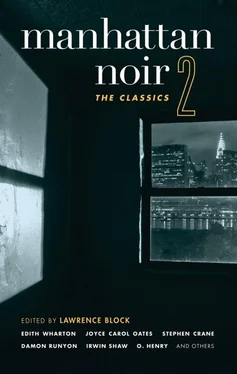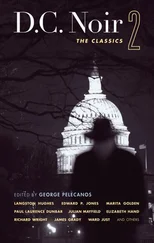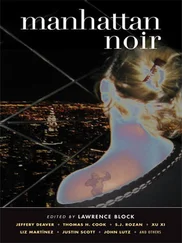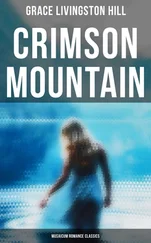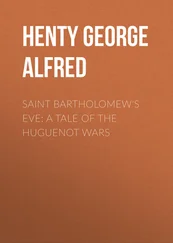Geoffrey Bartholomew - Manhattan Noir 2 - The Classics
Здесь есть возможность читать онлайн «Geoffrey Bartholomew - Manhattan Noir 2 - The Classics» весь текст электронной книги совершенно бесплатно (целиком полную версию без сокращений). В некоторых случаях можно слушать аудио, скачать через торрент в формате fb2 и присутствует краткое содержание. Город: New York, Год выпуска: 2008, ISBN: 2008, Издательство: Akashic Books, Жанр: Детектив, на английском языке. Описание произведения, (предисловие) а так же отзывы посетителей доступны на портале библиотеки ЛибКат.
- Название:Manhattan Noir 2: The Classics
- Автор:
- Издательство:Akashic Books
- Жанр:
- Год:2008
- Город:New York
- ISBN:978-1-933354-57-6
- Рейтинг книги:5 / 5. Голосов: 1
-
Избранное:Добавить в избранное
- Отзывы:
-
Ваша оценка:
- 100
- 1
- 2
- 3
- 4
- 5
Manhattan Noir 2: The Classics: краткое содержание, описание и аннотация
Предлагаем к чтению аннотацию, описание, краткое содержание или предисловие (зависит от того, что написал сам автор книги «Manhattan Noir 2: The Classics»). Если вы не нашли необходимую информацию о книге — напишите в комментариях, мы постараемся отыскать её.
, mystery titan Lawrence Block explores the historic literary roots of this dark island.
Featuring stories by: Edith Wharton, Stephen Crane, O. Henry, Langston Hughes, Irwin Shaw, Jerome Weidman, Damon Runyon, Evan Hunter, Jerrold Mundis, Edgar Allan Poe, Horace Gregory, Geoffrey Bartholomew, Cornell Woolrich, Barry N. Malzberg, Clark Howard, Jerome Charyn, Donald E. Westlake, Joyce Carol Oates, Lawrence Block, and Susan Isaacs.
Manhattan Noir 2: The Classics — читать онлайн бесплатно полную книгу (весь текст) целиком
Ниже представлен текст книги, разбитый по страницам. Система сохранения места последней прочитанной страницы, позволяет с удобством читать онлайн бесплатно книгу «Manhattan Noir 2: The Classics», без необходимости каждый раз заново искать на чём Вы остановились. Поставьте закладку, и сможете в любой момент перейти на страницу, на которой закончили чтение.
Интервал:
Закладка:
And Stephanie’s tax records and household accounts were a mess. I first became aware of this when I came home one evening to find Stephanie, furrow-browed, huddled at the dining-room table with Serge Ostogoth, her — our — accountant. It was tax time and the table was a snowdrift of papers in no discernible order. Serge, a harmless drudge with leather elbow patches and a pathetic small mustache, was patiently taking Stephanie through the year just past, trying to match the paperwork to the history, a task that was clearly going to take several days. Serge had been Stephanie’s accountant for three years, I later learned, and every year they had to go through this.
So I rolled up my sleeves to pitch in. Serge was grateful for my help. Stephanie, with shining eyes, kept telling me I was her savior, and eventually we managed to make sense of it all.
It was then I decided to put Stephanie’s house in order. There was no point mentioning my plan; Stephanie was truly ashamed of her record-keeping inabilities, so why rub her nose in it? Evenings and weekends, if we weren’t doing anything else, not flying out to the cottage or off to visit friends or out to theater and dinner, I’d spend half an hour or so working through her fiscal accounts.
Yes, and her previous husband, Robert, had been no help. When I got back that far, there was no improvement at all. In fact, Robert had been at least as bad as Stephanie about keeping records, and much worse when it came to throwing money around. A real wastrel. Outgo exceeded income all through that marriage. His life insurance, at the end, had been a real help.
And so had Frank’s.
It was a week or two after I’d finished rationalizing the Robert years — two of them, though in three tax years — that my work brought me to my first encounter with Frank. Another husband, last name Bullock. Frank Bullock died three and a half years before Stephanie’s marriage to Robert Morwell. Oh, yes, and he, too, had been well-insured. And with him, too, insurance paid double indemnity for accidental death.
Robert had been drowned at sea while on a cruise with Stephanie. Frank had fallen from the terrace of this very apartment while leaning out too far with his binoculars to observe the passage of an unusual breed of sea gull; Frank had been an amateur ornithologist.
And Leslie Hanford had fallen off a mountain in the Laurentians while on a Canadian ski holiday. Hanford was the husband before Bullock. Apparently, the first husband. Leslie’s insurance, in fact, had been the basis for the fortune Stephanie now enjoyed, supplemented when necessary or convenient by the insurance of her later husbands. After each accidental death, Stephanie changed insurance agents and accountants. And each husband had died just over a year after the policy had been taken out.
Just over a year. So that’s how long my bride expected to share my company, was it? Well, she was right about that, though not in the way she expected. I, too, could be decisive when called upon.
Whenever the weather was good, Stephanie took the sun on our terrace. Although it would be plagiarizing a bit from my bride, I could one day, having established an alibi at the office….
The current insurance agent was named Oliver Swerdluff. I went to see him. “I just wanted to be sure,” I said, “that the new policy on my life went through without a hitch. In case anything happened to me, I’d want to be certain Stephanie was cared for.”
“An admirable sentiment,” Swerdluff said. He was a puffy, sweaty man with tiny eyes, a man who would never let suspicion get between himself and a commission. Stephanie had chosen well.
I said, “Let me see, that was — half a million?”
“Oh, we felt a million would be better,” Swerdluff said with a well-fed smile. “Double indemnity.”
“Of course!” I exclaimed. “Excuse me, I get confused about these numbers. A million, of course. Double indemnity. And that’s exactly the amount we want for the new policy, to insure Stephanie’s life. If that’s what I’m worth to her, she’s certainly that valuable to me.”
Call me a fool, but I fell in love. Bruce was so different from the others, so confident, so self-reliant. And it was so clear he loved me, loved me , not my money, not the advantages I brought him. I tried to be practical, but my heart ruled my head. This was a husband I was going to have to keep.
Many’s the afternoon I spent sunbathing and brooding on the terrace while Bruce was downtown at the firm. On one hand, I would have financial security for at least a little while. On the other hand, I would have Bruce.
Ah, what this terrace could be! Duckboarded, with wrought-iron furniture, a few potted hemlocks, a gaily striped awning….
Well, what of it? What was a row of hemlocks in the face of true love? Bruce and I could discuss our future together, our finances. A plan, shared with another person.
We would have to economize, of course, and the first place to do so was with that million-dollar policy. I wouldn’t be needing it now, so that was the first expense that could go. I went back to see Mr. Swerdluff. “I want to cancel that policy,” I said.
“If you wish,” he said. “Will you be canceling both of them?”
A Manhattan romance
by Joyce Carol Oates
Central Park South
(Originally published in 1997)
Y our Daddy loves you, that’s the one true thing .
Never forget, Princess: that’s the one true thing in your life of mostly lies .
That wild day! I’d woken before it was even dawn; I seemed to know that a terrible happiness was in store.
I was five years old; I was feverish with excitement; when Daddy came to pick me up for our Saturday adventure as he called it, it had just begun to snow; Momma and I were standing at the tall windows of our eighteenth-floor apartment looking out across Central Park when the doorman rang; Momma whispered in my ear, “If you said you were sick, you wouldn’t have to go with — him.” For she could not utter the word Daddy , and even the words your father made her mouth twist. I said, “Momma, I’m not sick! I’m not.” So the doorman sent Daddy up. Momma kept me with her at the window, her hands that sometimes trembled firm on my shoulders and her chin resting on the top of my head so I wanted to squirm away but did not dare, not wanting to hurt Momma’s feelings or make her angry. So we stood watching the snowflakes — a thousand million snowflakes drifting downward out of the sky glinting like mica in the thin sunshine of early December. I was pointing and laughing; I was excited by the snow, and by Daddy coming for me. Momma said, “Just look! Isn’t it beautiful! The first snow of the season.” Most of the tall trees had lost their leaves, the wind had blown away their leaves that only a few days before had been such bright, beautiful colors, and you could see clearly now the roads curving and dipping through the park; you could see the streams of traffic — yellow taxis, cars, delivery vans, horse-drawn carriages, bicyclists; you could see the skaters at Wollman Rink, and you could see the outdoor cages of the Children’s Zoo, which was closed now; you could see the outcroppings of rock like miniature mountains; you could see the ponds glittering like mirrors laid flat; the park was still green, and seemed to go on forever; you could see to the very end at 110th Street (Momma told me the name of this distant street, which I had never seen close up); you could see the gleaming cross on the dome of the Cathedral of St. John the Divine (Momma told me the name of this great cathedral, which I had never seen close up); our new apartment building was at 31 Central Park South and so we could see the Hudson River to the left, and the East River to the right; the sun appeared from the right, above the East River; the sun vanished to the left, below the Hudson River; we were floating above the street seventeen floors below; we were floating in the sky, Momma said; we were floating above Manhattan, Momma said; we were safe here, Momma said, and could not come to harm. But Momma was saying now in her sad angry voice, “I wish you didn’t have to go with — him. You won’t cry, will you? You won’t miss your momma too much, will you?” I was staring at the thousand million snowflakes; I was excited waiting for Daddy to ring the bell at our front door; I was confused by Momma’s questions because wasn’t Momma me? so didn’t Momma know? the answer to any question of Momma’s, didn’t Momma already know? “I wish you didn’t have to leave me, darling, but it’s the terms of the agreement — it’s the law.” These bitter words It’s the law fell from Momma’s lips each Saturday morning like something dropped in the apartment overhead! I waited to hear them, and I always did hear them. And then Momma leaned over me and kissed me; I loved Momma’s sweet perfume and her soft-shining hair but I wanted to push away from her; I wanted to run to the door, to open it just as Daddy rang the bell; I wanted to surprise Daddy, who took such happiness in being surprised; I wanted to say to Momma, I love Daddy better than I love you, let me go! Because Momma was me, but Daddy was someone so different.
Читать дальшеИнтервал:
Закладка:
Похожие книги на «Manhattan Noir 2: The Classics»
Представляем Вашему вниманию похожие книги на «Manhattan Noir 2: The Classics» списком для выбора. Мы отобрали схожую по названию и смыслу литературу в надежде предоставить читателям больше вариантов отыскать новые, интересные, ещё непрочитанные произведения.
Обсуждение, отзывы о книге «Manhattan Noir 2: The Classics» и просто собственные мнения читателей. Оставьте ваши комментарии, напишите, что Вы думаете о произведении, его смысле или главных героях. Укажите что конкретно понравилось, а что нет, и почему Вы так считаете.
